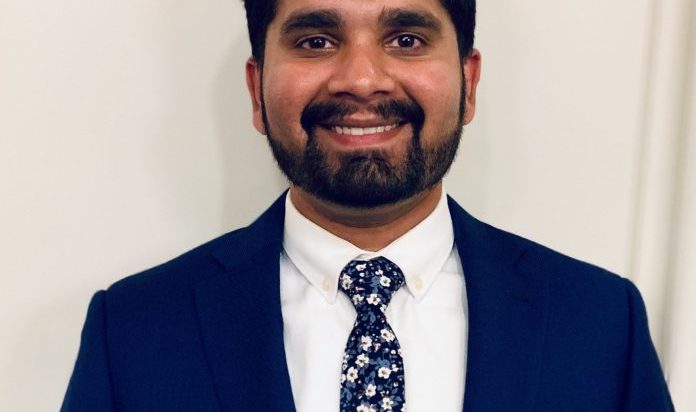From Lab Science to Data Science: How Umair Khakoo’s Problem-Solving Mindset Helped Him Get Ahead in the Tech Industry

You can’t always tell how one life experience will prepare you for the next. Back in college, Umair Khakoo loved experimenting in the laboratory as a chemistry major. What he didn’t realize was just how valuable the problem-solving mindset he developed during his undergraduate years would eventually become in an entirely new setting: the technology industry.
The idea to merge the two disciplines first occurred to Umair in 2018, when he accepted a technical job at the software consulting company Canidium. There, he developed an interest in data science — and began wondering how he could apply lessons from the chemistry lab to his new line of work. “I knew we could get better insights by thinking problems through from a scientific perspective,” he said.
Determined to achieve this goal, Umair enrolled in The Data Analysis and Visualization Boot Camp at Texas McCombs. Here’s his story, in his own words.
How did the boot camp help you in your role at Canidium?
The boot camp helped me a lot at work. Now, I have more credibility explaining technical concepts to clients and new employees. My coworkers will say, “Umair is the API expert. Go talk to him.” Right now, we’re also brainstorming ideas for new corporate revenue streams. I’m a big advocate for offering data analytics as a service. For instance, we could use machine learning to help clients that need to forecast sales for next quarter but don’t have enough in-house talent. Experienced consultants and architects are on board with my idea, and I’ve planted the seed with leadership too. They’re listening and paying attention.
What was the most valuable skill you gained in the boot camp?
I learned how to learn, which is such an underrated skill. In the boot camp, you learn at a very fast pace while using lots of different technologies: debugging problems, realizing when you’re stuck, and seeking answers. Learning how to independently explore and test different solutions sets you up for success in the tech industry.
In November 2019, you accepted a TA role at the same boot camp you graduated from. Congratulations! How did you land the job?
My instructor recommended me for the TA position since he said I’d done a really good job of helping my classmates during the boot camp. He convinced me this would be a smart career move: going through the entire experience again, from the other side.
Can you describe how you helped classmates during the boot camp?
Whenever we had hard homework assignments, I’d organize meetups. We’d get together in a coffee shop and see how we could support each other. Within my project teams, I was very good at giving people tasks they could manage — gauging what they felt comfortable doing and assigning responsibilities based on that. That ability is really useful as a TA, since I’m now in charge of creating the project teams in my section.
How else did your experience as a student make you a better TA?
I’m much more empathetic because of my time in the boot camp. I understand when my students struggle, and why they struggle. That’s huge.
Have you continued sharpening your technical skills as a TA?
Being a TA has led to a lot of ongoing learning on my part. When you’re a student and you don’t know something, you ask the TA. When you’re a TA and don’t know something, you figure it out by turning to online resources. Helping students through the boot camp improves my own industry knowledge.
Looking ahead at your professional future, where do you see yourself going from here?
I’m applying for a few different masters programs next year. I’m really interested in biotechnology — and looking at different curricula, I see that the information we learned in the boot camp is very useful. After earning my masters, I want to go into data science at a biotech company. My interest in biotechnology started in high school, when I read Jurassic Park. That planted the seed in my mind, and since then I’ve been fascinated with the ethical questions surrounding the power of technology. I’m a big advocate of understanding technology before you jump on board. Tech itself isn’t evil — it’s powerful. What we choose to do with it will have huge ramifications on society and on the future.
What advice would you give people considering the boot camp?
Do your research. Know the big picture you’re striving for and the programming languages you want to learn. I wanted to make sure the boot camp would be relevant to my career trajectory, so I studied data science job postings and contacted friends in the industry. The boot camp taught JavaScript, Python, and SQL — and all three programming languages showed up in data scientist job postings. The curriculum matched what recruiters were looking for.

 Live Chat
Live Chat